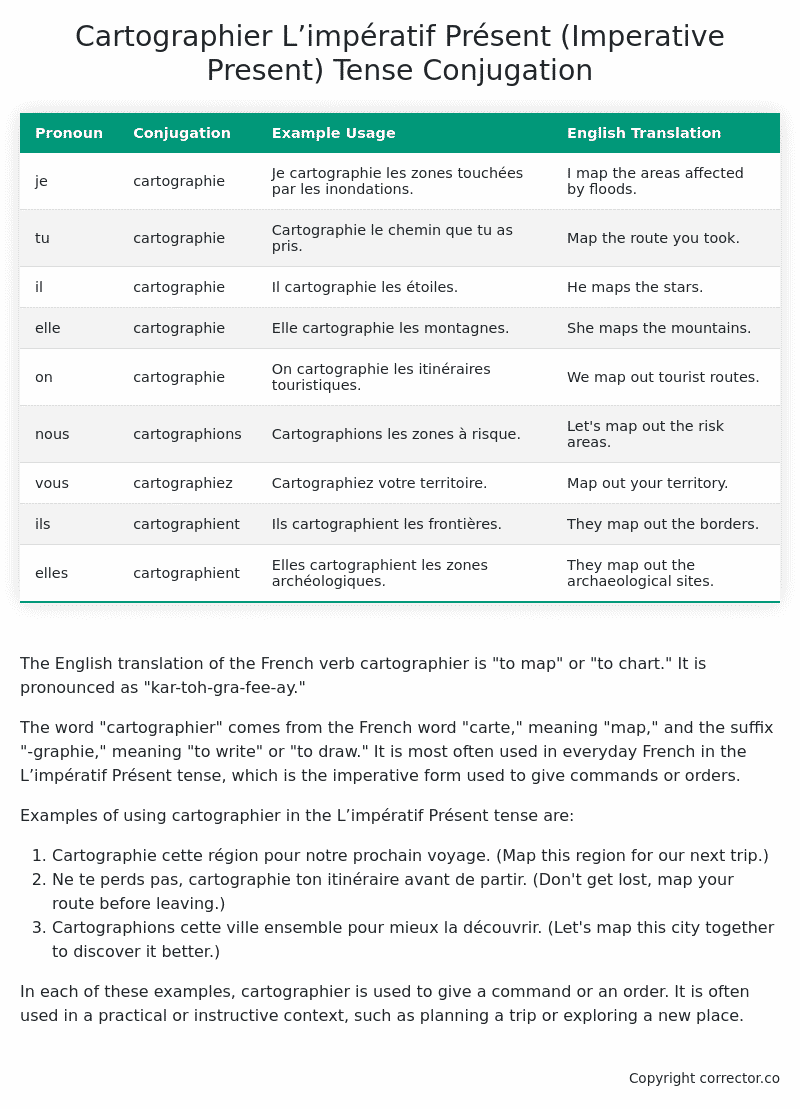L’impératif Présent (Imperative Present) Tense Conjugation of the French Verb cartographier
Introduction to the verb cartographier
The English translation of the French verb cartographier is “to map” or “to chart.” It is pronounced as “kar-toh-gra-fee-ay.”
The word “cartographier” comes from the French word “carte,” meaning “map,” and the suffix “-graphie,” meaning “to write” or “to draw.” It is most often used in everyday French in the L’impératif Présent tense, which is the imperative form used to give commands or orders.
Examples of using cartographier in the L’impératif Présent tense are:
- Cartographie cette région pour notre prochain voyage. (Map this region for our next trip.)
- Ne te perds pas, cartographie ton itinéraire avant de partir. (Don’t get lost, map your route before leaving.)
- Cartographions cette ville ensemble pour mieux la découvrir. (Let’s map this city together to discover it better.)
In each of these examples, cartographier is used to give a command or an order. It is often used in a practical or instructive context, such as planning a trip or exploring a new place.
Table of the L’impératif Présent (Imperative Present) Tense Conjugation of cartographier
| Pronoun | Conjugation | Example Usage | English Translation |
|---|---|---|---|
| je | cartographie | Je cartographie les zones touchées par les inondations. | I map the areas affected by floods. |
| tu | cartographie | Cartographie le chemin que tu as pris. | Map the route you took. |
| il | cartographie | Il cartographie les étoiles. | He maps the stars. |
| elle | cartographie | Elle cartographie les montagnes. | She maps the mountains. |
| on | cartographie | On cartographie les itinéraires touristiques. | We map out tourist routes. |
| nous | cartographions | Cartographions les zones à risque. | Let’s map out the risk areas. |
| vous | cartographiez | Cartographiez votre territoire. | Map out your territory. |
| ils | cartographient | Ils cartographient les frontières. | They map out the borders. |
| elles | cartographient | Elles cartographient les zones archéologiques. | They map out the archaeological sites. |
Other Conjugations for Cartographier.
Le Present (Present Tense) Conjugation of the French Verb cartographier
Imparfait (Imperfect) Tense Conjugation of the French Verb cartographier
Passé Simple (Simple Past) Tense Conjugation of the French Verb cartographier
Passé Composé (Present Perfect) Tense Conjugation of the French Verb cartographier
Futur Simple (Simple Future) Tense Conjugation of the French Verb cartographier
Futur Proche (Near Future) Tense Conjugation of the French Verb cartographier
Plus-que-parfait (Pluperfect) Tense Conjugation of the French Verb cartographier
Passé Antérieur (Past Anterior) Tense Conjugation of the French Verb cartographier
Futur Antérieur (Future Anterior) Tense Conjugation of the French Verb cartographier
Subjonctif Présent (Subjunctive Present) Tense Conjugation of the French Verb cartographier
Subjonctif Passé (Subjunctive Past) Tense Conjugation of the French Verb cartographier
Subjonctif Imparfait (Subjunctive Imperfect) Tense Conjugation of the French Verb cartographier
Conditionnel Présent (Conditional Present) Tense Conjugation of the French Verb cartographier
Conditionnel Passé (Conditional Past) Tense Conjugation of the French Verb cartographier
L’impératif Présent (Imperative Present) Tense Conjugation of the French Verb cartographier (this article)
L’infinitif Présent (Infinitive Present) Tense Conjugation of the French Verb cartographier
Struggling with French verbs or the language in general? Why not use our free French Grammar Checker – no registration required!
Get a FREE Download Study Sheet of this Conjugation 🔥
Simply right click the image below, click “save image” and get your free reference for the cartographier L’impératif Présent tense conjugation!

Cartographier – About the French L’impératif Présent (Imperative Present) Tense
Usage
Giving commands
Making requests
Offering advice
Expressing desires
Conjugation Formation
Interactions with other tenses
Want More?
I hope you enjoyed this article on the verb cartographier. Still in a learning mood? Check out another TOTALLY random French verb conjugation!


